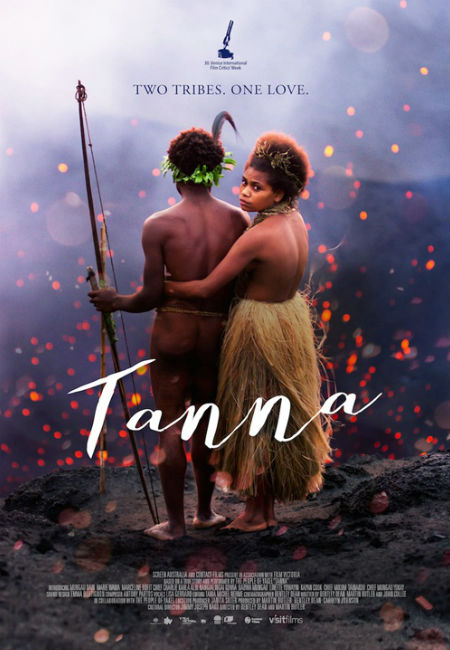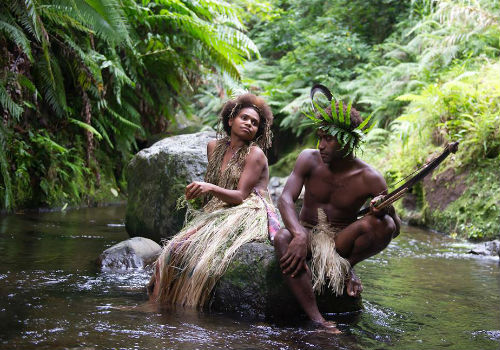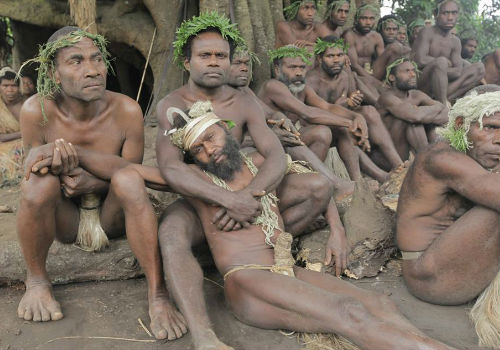
It was Shakespeare, through the character Lysander in A Midsummer Night’s Dream, who eloquently observed that “The course of true love never did run smooth.”
It’s a universal truth that resonates powerfully in Tanna, the first feature film by Australian documentary makers Bentley Dean and Martin Butler, which tells the tale of two young lovers, Wawa (Marie Wawa) and Dain (Mangau Dain) who find the power and passion of their forbidden bond is not enough to overcome centuries of entrenched tribal customs.
Of course, like young lovers the world over, they firmly believe there must be a way to surmount all the impossible obstacles thrown in their way, as if sheer obstinacy and loyalty to each other will be enough to convince the chief of their tribe the Yakel, Charlie (Chief Charlie Kahla) that Wawa should not be given over in marriage to the neighbouring tribe, the Imedin led by Chief Mikum (Chief Mikum Tainakou).
A peace offering of sorts in a deal brokered by the Peacekeeping Chief (Chief Mungau Yokay), Wawa’s hand in marriage is a strategic masterstroke designed to usher in peace between the two warring tribes,and so, even those close to the teenage beauty, who is close to her endlessly mischievous younger sister Selin (Marceline Rofit), such as her father Lingai (Lingai Kowia) and her grandmother, urge her to listen not to her heart but to rather to the greater good.
Though she is torn, it is Wawa’s heart that prevails and she and Dain are forced to go on the run to escape their fate, sending in a train a series of events that threaten to unravel the peace deal, and plunge the two tribes, among the last holding to traditional values on the spectacularly-beautiful volcanic island of Tanna in Vanuatu, into violent disruptive enmity once again.

What makes this universal tale of love, based on actual events that played out on the island in 1987, so compelling and emotionally engaging is that it takes place within the traditional society of Tanna, which has changed little for centuries.
As the chief Charlie notes with vigour at one point, their tribe and those of their neighbours have resisted the colonial powers – the French and British had joint possession of Vanuatu till it was gained independence in 1980 – the Christians who accompanied them, and the monetary society they introduced.
There is therefore a lot at stake – not simply the prospect of immediate peace between two tribes, but the continuation of a sacred, well-established system of belief known as Kastom Roads, which depends on faithful observance of such customs as arranged marriage, and tribal interdependence.
In the faces of the forces arranged against them, not least the near-irresistible sweep of modernisation across the island, any chink in the subscription to this system of beliefs could threaten it in its entirety and so, much effort is put into convincing Wawa to forgo the passionate feelings she has for Dain in favour of keeping this traditional show on the road, so to speak.
Much like Romeo and Juliet before them, they’ll have none of it course, investing the narrative of this exquisitely-wrought film with more tension than it’s delightfully poetic, utterly immersive pace might suggest.

Tanna is on every level beautifully and wonderfully made.
Everything from the way we are introduced, with a visual and storytelling elegance that continues throughout the film, to the tribe with scenes of everyday life, anchored by the charm and innocently roguish charm of Selin who is a force unto herself, and a driving force in the narrative, to the lush cinematography which captures the lush greens of the jungle, the fiery red of Tanna’s active volcano and the luminescent blue and white of its stars, to the emotive music by Antony Partos (Animal Kingdom) is near-perfectly realised.
You are drawn and immersed into the world of the people of Tanna, and their struggle between prevailing forces of change and long held tradition, which has served them well, in such a profoundly complete and authentic way – Dean and Butler spent 7 months living with the Yakel, who perform all the parts in the film with the accomplishment and feel of professional actors – that it’s as if you are a part of this magnificent film rather than simply an enraptured observer.
Tanna‘s mix of universal truth and rich, local custom is deeply moving, and involving in a way few films ever achieve.
The truth of its storytelling, and the beauty of its execution is a reminder that no matter the origin of a story, shared human experience will always be a richly rewarding, deeply felt thing, especially in films as beautifully realised as this one.